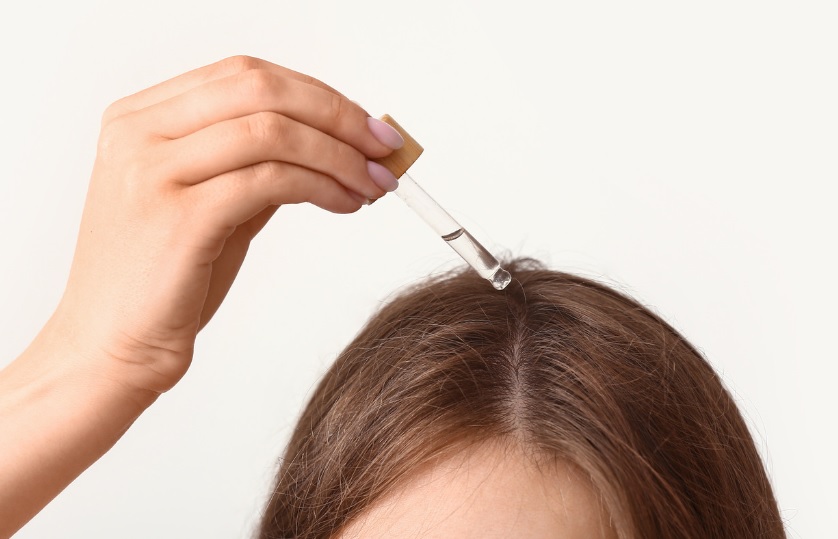
Most effective essential oils that can help prevent hair loss and promote hair growth.
Essential oils are a popular natural remedy believed to promote hair growth in women. While scientific evidence is limited, some essential oils have been traditionally used and may have potential benefits for hair health. Here are some essential oils that are commonly used for promoting hair growth:
Lavender Oil
Lavender oil has antimicrobial properties that may improve scalp health. It may also help reduce stress, which can be a contributing factor to hair loss. Lavender oil has natural antimicrobial properties, which can help maintain a clean and healthy scalp. This can be especially beneficial if you have dandruff, scalp irritation, or other scalp conditions that could hinder hair growth.
Rosemary Oil
Rosemary oil is believed to increase blood circulation to the scalp, which can stimulate hair follicles and promote hair growth. It also has antimicrobial properties. Dihydrotestosterone (DHT) is a hormone linked to hair loss, especially in cases of androgenetic alopecia (male and female pattern baldness). Some studies suggest that rosemary oil may inhibit the production of DHT, which could slow down hair loss.
Peppermint Oil
Peppermint oil may help with hair growth by improving blood flow to the scalp and providing a cooling sensation. It can also help to reduce dandruff and itching. Some proponents suggest that peppermint oil may contribute to thicker and stronger hair by promoting the production of collagen, which is essential for hair structure.
Cedarwood Oil
Cedarwood oil is thought to help balance the oil-producing glands in the scalp. This can be particularly beneficial for individuals with oily scalps, as excessive oil production can sometimes lead to hair problems. Cedarwood oil has antimicrobial properties that may help keep the scalp clean and healthy, reducing the risk of dandruff or scalp irritation.
Thyme Oil
Thyme oil has natural antimicrobial and antifungal properties, which can help maintain a clean and healthy scalp. This can be especially beneficial for individuals with scalp conditions or dandruff. Massaging thyme oil into the scalp may stimulate blood circulation, potentially nourishing the hair follicles and promoting hair growth.
Jojoba Oil
Jojoba oil is often used as a carrier oil for essential oils. It’s thought to nourish the hair and scalp and help maintain their health. Jojoba oil has moisturising and emollient properties, making it a good option for addressing dry and flaky scalps. A healthy scalp is essential for promoting hair growth.
Clary Sage Oil
Clary sage oil may help women experiencing menopause. Clary sage oil is thought to have hormone-balancing properties and may help regulate hormonal imbalances. Hormonal imbalances, such as those related to menopause or polycystic ovary syndrome (PCOS), can contribute to hair loss.
Tea Tree Oil
Tea tree oil has antimicrobial properties and can help with scalp conditions that may hinder hair growth. While not a direct hair growth stimulant, a healthy and clean scalp is essential for promoting hair growth. By maintaining scalp health, tea tree oil indirectly supports hair growth.
How to use essential oils for hair growth
When using essential oils for hair growth, it’s important to dilute them with a carrier oil, such as jojoba, coconut, or almond oil, to prevent irritation. Typically, you’d mix a few drops of the essential oil with a tablespoon of carrier oil and apply it to your scalp. Leave it on for at least 30 minutes before shampooing. You can also add a few drops of essential oil to your regular shampoo or conditioner.
Please keep in mind that essential oils can be potent, and individual reactions may vary. Always perform a patch test to ensure you don’t have an adverse reaction, and if you have any underlying health conditions or concerns about hair loss, consult with a healthcare professional or dermatologist for a personalized approach to hair care and treatment.
Additionally, essential oils should be used with caution during pregnancy, and certain oils may not be suitable for everyone.


Leave a Reply